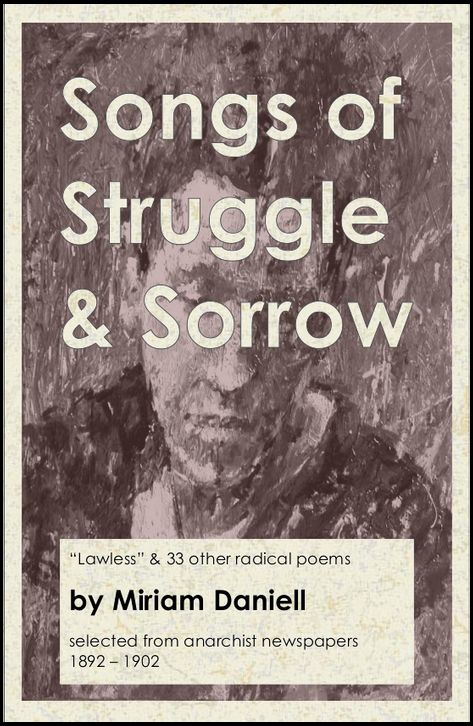C4SS has teamed up with the Distro of the Libertarian Left. The Distro produces and distribute zines and booklets on anarchism, market anarchist theory, counter-economics, and other movements for liberation. For every copy of Miriam Daniell’s “Songs of Struggle and Sorrow” that you purchase through the Distro, C4SS will receive a percentage. Support C4SS with Miriam Daniell’s “Songs of Struggle and Sorrow“.
$1.50 for the first copy. $0.75 for every additional copy.
“A voice rebellious, which should never cease…”
This chapbook is a new selection of poetry by Miriam Daniell, edited by the ALL Distro. The 34 poems in this collection were gathered from two main sources: her prolific contributions to Benjamin Tucker’s individualist paper Liberty during 1892; and a series of several more poems prepared for posthumous publication by her friends, which appeared in the Chicago anarchist paper Free Society during 1902.
The Anarchist press of the late 19th and early 20th centuries published much more than ideological tracts, polemics and political analysis. In their newspapers, pamphlets, union halls, radical community schools and gatherings, Anarchists and labor radicals alike worked to build a broad, vibrant and lovingly crafted culture of creative solidarity and resistance. Theoreticians, workers, storytellers and dreamers made cartoons, posters, poems, stories and labor songs. One of the most restless and, for a few years, one of the most prolific of these authors was Miriam Daniell (1860–1894), a strike leader in England and a prolific poet, writer and critic in the u.s. radical press.
Daniell was an English-American labor activist, writer, and individualist anarchist. Born in England, she helped to organize a wave of textile workers’ and dock-workers’ strikes in Bristol in 1889–90, one of the most significant labor uprisings in Bristol’s history. In 1890, she left a stifling marriage, and England, together with her close friend and fellow organizer Helena Born (the subject of the intimate “To H. B.,” included here). When she arrived in Boston, she became involved with both the free love movement and American individualist anarchism. For a few years she became a prolific contributor to the radical press, with work from her hand appearing in almost every issue of Tucker’s Liberty for several months running, until her hand was stilled by a tragic death at the age of 34. She left us these poems. The 34 collected here offer a sample not only of her feminist and radical labor poetry, but also her personal and confessional moments, her humor, her vivid sense of the eerie and grotesque, and her meditations on sorrow, struggle and loss.








